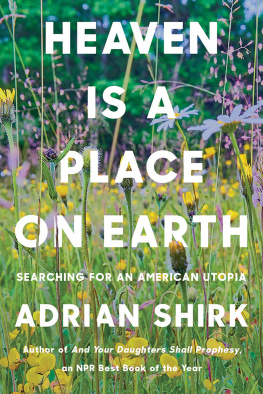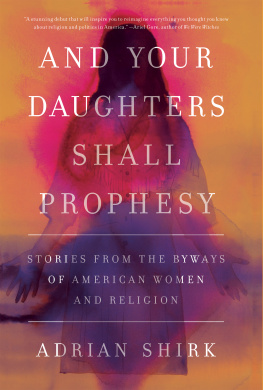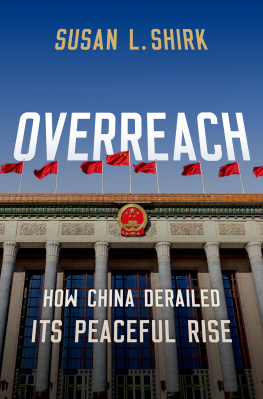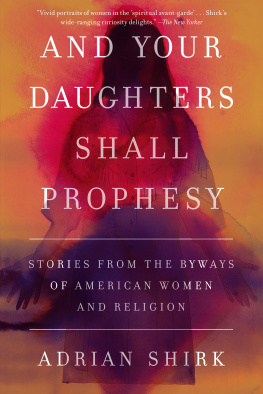Table of Contents
Guide
Page List
Advance Praise for
Heaven Is a Place on Earth
This book could not have come at a better time. At a moment when it can seem as if this country will never put its pieces together, Adrian Shirk gives us so many instances, historical and present-day, of Americans finding ways to live in real community, to carve out places of freedom, to be brave enough to stare our unhappinesses in the face and ask What more could there be? In a voice electric with possibility, Shirk reminds us of the great risk and great possibility contained in the act of reimagining home.
Alex Mar, author of Witches of America
What kind of world will we create in the wake of a global pandemic and armed insurrection, in the midst of climate chaos, systemic racism, and inequity? In Heaven Is a Place on Earth, the brilliant Adrian Shirk is looking for an existence that is more than just mere existence, more than waged labor, a life that is less extractive, capitalistic, and crushing. A life that is, instead, meaningful, creative, and beautiful. In these pages, I found myself believing such a thing might be possible, and you will tooa testament to Adrians tremendous power as a writer, intellectual, and human. This is an important book for the moment we find ourselves in.
Cameron Dezen Hammon, author of This Is My Body:
A Memoir of Religious and Romantic Obsession
As she physically travels all over our country and through some of lifes roughest emotional terraingrief, regret, inadequacy, betrayal, unrequited idealismAdrian Shirk takes the reader on a rich, lyrical journey of what it feels and looks like to persist in hope. Whether those hopes are in the form of a utopian farm cooperative formed in the 1800s or earnest hipsters gathering in upstate New York, even if you dont share their same dreams Shirks writing leaves you wanting to treat hope, as she puts it, as a vocation. Heaven Is a Place on Earth is not so much a study of utopianism as a meditation. Shirk has a skillful way of weaving together the scraps of seemingly unrelated snippets and insights into a gorgeous quilt of meaning. Utopian-ists want what we all wantfulfillment, happiness, communitybut they dont give up when life refuses to deliver. This book is a raw examination of that combination of obsession and gritand its masterful.
Kate Kelly, human rights lawyer and
author of Ordinary Equality
HEAVEN IS A PLACE ON EARTH
ALSO BY ADRIAN SHIRK
And Your Daughters Shall Prophesy:
Stories from the Byways of American Women and Religion
HEAVEN IS
A PLACE
ON EARTH

SEARCHING FOR
AN AMERICAN UTOPIA

ADRIAN SHIRK
Counterpoint
Berkeley, California
For our friends
They say in heaven, love comes first
Well make heaven a place on earth
BELINDA CARLISLE
Ascending a path that seems to lead nowhere, you come at last to New Harmony, a disappointment.
MARGUERITE YOUNG , Angel in the Forest
It takes the crossing of continents, wars, an unexpected last child for us to come into existence. Do not give up this extensive route of failures and impossible encounters too easily.
YANARA FRIEDLAND , Uncountry
And finally, [utopian literatures] most characteristic feature is that its very futuristic looking. Im also future-oriented, but it has to do with memory, with what I know is possible because it already happened.
TONI CADE BAMBARA
CONTENTS
Amber, Laura, and I are driving through the back roads just outside of Nashville, away from Percy Priest Lake, singing along to Belinda Carlisles 1987 ballad, Heaven Is a Place on Earth. Were steaming in our damp swimsuits from the heat. Yellow poplars and crepe myrtles and sugar maples rush by the windows on the winding road to Ambers house. The chorus mounts to its third and final iteration through the car speakers. Laura, sitting shotgun, speaks back to the song: Ive always liked this partwhere she goes, Well make heaven a place on earth / Heaven is a place on earth, like, that was FAST, Belinda!
Laura and I have flown down from New York City for a weekend-length writing retreat in Ambers living room. All three of us are currently reading Cruising Utopia by Jos Esteban Muoz, passing it back and forth as we leave it bookmarked on the coffee table. We are thinking along with him about how utopia is, or can be, any gesture that points to a better future, a gesture of futurity he finds repeated over and over again in the symbols and praxis of queer life, especially in the decades prior to the technocrat-takeover of things like New Yorks Pride March, which is a week away at that momentand so corporate now as to be a figment of the outlaw queer imagination. Utopianism, for Muoz, is something thats necessarily always in process, something thats simultaneously aspired to down the road and ushered into the presentthe now-future. I keep thinking of the way that 1960s and 70s gay liberationists named their organizationsthe names always struck me as the kinds of gestures Muoz talks about, names that point toward, but also make present, a world much larger, lovelier, and more fun than ours: Daughters of Bilitis, Gay Pagans, Alice B. Toklas Democratic Club, Council of Grand Dukes & Duchesses of San Francisco, Order of Displaced Okies, Local Lesbian Association Kazoo Marching Band, Dykes on Bikes, Imperial Silver Fox Court, Lavender Menace, Lesbian Avengers, Free Beach Activists, Society of Janus, the Furies.
T he pursuit of utopia is, at its heart, about our relationship with time. Utopians sit around dreaming about the beginning and the end, as a way to decide what to build in the present: What kind of human community will heal the scars of the past, and ensure a brighter future? Which systems or relationships do we wish would last forever, but will only ever be temporary? What will the end be like, and is there an end, and should we make it look like what we imagine the Edenic beginning looked like, if eer there was one? There are other factors, of courseto each her own utopia, after allbut when the particulars are wiped away, the common questions are always temporal. Book writing is similar. When I started working on this book, I was twenty-nine years old, and by the time I finish I will be thirty-two, a three-year period where my own responses to these basically rhetorical questions would at once be fulfilled and rendered obsolete by the end of the process, which, like all books, and all utopias for that matter, has no real end.
Before I was conscious of this being a book, I had been dimly aware for some time that I was writing about American utopian communities. I had been reading, watching YouTube videos, visiting communes, staring at my smudgy laptop lost in my own personal utopian yearnings. I was writing a lot, reams of things I referred to even in the privacy of my own mind as just notes, and I had finally amassed something like 120 individual Word files titled things like Utopia_Nashville, Utopia_Bruderhof, Utopia_Womanhouse, etc., etc. Each of these files contained floating narratives, orphaned thoughts, direct experiences, embarrassing disclosures, desperate prayers, voyeuristic observations, rants, passages from books, stolen photos, copy-and-pasted emails.









